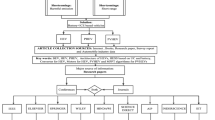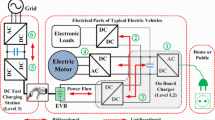Abstract
Fuel cell durability and vehicle operating cost are the main optimization goals of energy management strategy (EMS) for fuel cell hybrid electric vehicles (FCHEV). In this paper, a series fuzzy control strategy (SFCS) is proposed to decrease the load changing rate of fuel cell system (FCs). The test bench is used to obtain the output characteristics and load changing capacity of FCs. In order to increase the driving mileage and to eliminate the uncertainty of manual experience in fuzzy controller, particle swarm optimization (PSO) is used to optimize the subjection function distribution and rule weights of fuzzy control, and the evaluation function is constructed by operating cost. Based on the experiment data of FC and battery, the model of the vehicle and strategy are constructed in the software environment, and the optimization result is obtained through simulation. The results show that the FCs load changing rate is reduced and limited to the range of change capacity through the SFCS, while the durability of the fuel cell is optimized. The SFCS optimized by PSO (PSFCS) increases the driving mileage. Under WLTC and UDDS conditions, mileage has been increased by 11.2 % and 8.79 % respectively.
Similar content being viewed by others
Abbreviations
- A :
-
windward area
- a :
-
vehicle acceleration rate
- C r :
-
rolling resistance coefficient
- C d :
-
Wind bound coefficient
- C bat :
-
battery capacity
- C fc :
-
the price of fuel cell system
- C ele :
-
the price of electricity
- \({C_{{H_2}}}\) :
-
the price of hydrogen
- \(co{n_{{H_2}}}\) :
-
hydrogen capacity
- SFCS:
-
series fuzzy control strategy
- D fc :
-
the degradation of fuel cell
- \(D_{fc}^ \ast \) :
-
the degradation of fuel cell system in this paper
- F t :
-
traction force
- F :
-
faraday constant
- FCS :
-
fuzzy control strategy
- I fc :
-
the output current of fuel cell system
- I cell :
-
the output current of single cell
- I req :
-
current demand
- m fc :
-
system instantaneous hydrogen consumption rate
- \({M_{{H_2}}}\) :
-
hydrogen molar mass
- N :
-
the number of single cells
- N com :
-
torque command
- P req :
-
power demand
- P mec :
-
mechanical power
- P ele :
-
electric power
- P fc :
-
the output power of fuel cell system
- P bat :
-
the output power of battery
- P lost :
-
the lost power of motor
- PSO :
-
particle swarm optimization
- PSFCS :
-
the SFCS optimized by PSO
- Q LHV :
-
hydrogen low heating value
- Q bat :
-
the capacity of battery
- P bat :
-
the internal resistance of battery
- S inl :
-
the evaluation index of PSO
- SOC :
-
the state of charge of battery
- U oc :
-
the open voltage of battery
- V mot :
-
the rotary velocity of motor
- V :
-
vehicle speed
- θ :
-
road slope
- δ m :
-
rotary mass coefficient
- η fc :
-
the efficiency of fuel cell system
- η mat :
-
the efficiency of motor
- ρ :
-
air density
References
Caux, S., Gaoua, Y. and Lopez, P. (2017). A combinatorial optimisation approach to energy management strategy for a hybrid fuel cell vehicle. Energy, 133, 219–230.
Chen, Y. K., Wu, Y. C., Song, C. C. and Chen, Y. S. (2012). Design and implementation of energy management system with fuzzy control for DC microgrid systems. IEEE Trans. Power Electronics 28, 4, 1563–1570.
Darwich, I., Lachhab, I. and Krichen, L. (2019). Implementation of an on-line multi-objective particle swarm optimization controllers gains self-adjusted of FC/UC system devoted for electrical vehicle. Int. J. Hydrogen Energy 44, 52, 28262–28272.
Dayeni, M. K., Macias, A., Dépature, C., Boulon, L., Kelouwani, S. and Chaoui, H. (2017). Real-time fuzzy logic strategy scheme for energetic macroscopic representation of a fuel cell/battery vehicle. IEEE Vehicle Power and Propulsion Conf. (VPPC). Belfort, France.
Ezzat, M. and Dincer, I. (2020). Exergoeconomic analysis and optimization of a new hybrid fuel cell vehicle. Int. J. Hydrogen Energy 45, 9, 5734–5744.
Fletcher, T., Thring, R. and Watkinson, M. (2016). An energy management strategy to concurrently optimise fuel consumption & PEM fuel cell lifetime in a hybrid vehicle. Int. J. Hydrogen Energy 41, 46, 21503–21515.
Gao, D., Jin, Z. and Lu, Q. (2008). Energy management strategy based on fuzzy logic for a fuel cell hybrid bus. J. Power Sources 185, 1, 311–317.
Hu, D., Wang, J., Hu, L., Zhou, J. and Liu, J. (2020). Research on the damping effect mechanism and optimization of super-high-speed electric air compressors for fuel cell vehicles under the stiffness softening effect. IEEE Access, 8, 179789–179797.
Hu, Z., Xu, L., Li, J., Ouyang, M., Song, Z. and Huang, H. (2018). A reconstructed fuel cell life-prediction model for a fuel cell hybrid city bus. Energy Conversion and Management, 156, 723–732.
Jin, J., Pan, J., Lu, Z., Wu, Q. and Xu, L. (2021). An investigation of a high-performance centrifugal compressor with a variable map width enhancement slot for proton exchange membrane fuel cell systems in commercial vehicle application. Proc. Institution of Mechanical Engineers, Part D: J. Automobile Engineering 235, 1, 288–300.
Li, Q., Chen, W., Li, Y., Liu, S. and Huang, J. (2012). Energy management strategy for fuel cell/battery/ultracapacitor hybrid vehicle based on fuzzy logic. Int. J. Electrical Power & Energy Systems 43, 1, 514–525.
Liu, Y., Liu, J., Zhang, Y., Wu, Y., Chen, Z. and Ye, M. (2020). Rule learning based energy management strategy of fuel cell hybrid vehicles considering multi-objective optimization. Energy, 207, 118212.
Lü, X., Wu, Y., Lian, J., Zhang, Y., Chen, C., Wang, P. and Meng, L. (2020). Energy management of hybrid electric vehicles: A review of energy optimization of fuel cell hybrid power system based on genetic algorithm. Energy Conversion and Management, 205, 112474.
Marcinkoski, J., JS, A. W. and Papageorgopoulos, D. (2015). Fuel cell system cost-2015. DOE hydrogen and fuel cells program record. Fuel Cell System Cost-2015. DOE Hydrogen and Fuel Cells Program Record. US Department of Energy.
Mohammadzadeh, A. and Rathinasamy, S. (2020). Energy management in photovoltaic battery hybrid systems: A novel type-2 fuzzy control. Int. J. Hydrogen Energy 45, 41, 20970–20982.
Punov, P. and Gechev, T. (2020). Energy management of a fuel cell hybrid ultra-energy efficient vehicle. Int. J. Hydrogen Energy 46, 38, 20291–20302.
Rezk, H., Nassef, A. M., Abdelkareem, M. A., Alami, A. H. and Fathy, A. (2019). Comparison among various energy management strategies for reducing hydrogen consumption in a hybrid fuel cell/supercapacitor/battery system. Int. J. Hydrogen Energy 46, 8, 6110–6126.
Saib, S., Hamouda, Z. and Marouani, K. (2017). Energy management in a fuel cell hybrid electric vehicle using a fuzzy logic approach. 5th Int. Conf. Electrical Engineering-Boumerdes (ICEE-B). Boumerdes, Algeria.
Shen, D., Lim, C. C. and Shi, P. (2020). Fuzzy model based control for energy management and optimization in fuel cell vehicles. IEEE Trans. Vehicular Technology 69, 12, 14674–14688.
Song, K., Chen, H., Wen, P., Zhang, T., Zhang, B. and Zhang, T. (2018). A comprehensive evaluation framework to evaluate energy management strategies of fuel cell electric vehicles. Electrochimica Acta, 292, 960–973.
Song, K., Wang, X., Li, F., Sorrention, M. and Zheng, B. (2020). Pontryagin’s minimum principle-based real-time energy management strategy for fuel cell hybrid electric vehicle considering both fuel economy and power source durability. Energy, 205, 118064.
Sulaiman, N., Hannan, M. A., Mohamed, A., Ker, P. J., Majlan, E. H. and Daud, W. W. (2018). Optimization of energy management system for fuel-cell hybrid electric vehicles: Issues and recommendations. Applied Energy, 228, 2061–2079.
Sun, Z., Wang, Y., Chen, Z. and Li, X. (2020). Min-max game based energy management strategy for fuel cell/supercapacitor hybrid electric vehicles. Applied Energy, 267, 115086.
Teng, T., Zhang, X., Dong, H. and Xue, Q. (2020). A comprehensive review of energy management optimization strategies for fuel cell passenger vehicle. Int. J. Hydrogen Energy 45, 39, 20293–20303.
Wang, Y., Sun, Z. and Chen, Z. (2019). Energy management strategy for battery/supercapacitor/fuel cell hybrid source vehicles based on finite state machine. Applied Energy, 254, 113707.
Wu, J., Zhang, C. H. and Cui, N. X. (2012). Fuzzy energy management strategy for a hybrid electric vehicle based on driving cycle recognition. Int. J. Automotive Technology 13, 7, 1159–1167.
Wu, J., Zhang, N., Tan, D., Chang, J. and Shi, W. (2020). A robust online energy management strategy for fuel cell/battery hybrid electric vehicles. Int. J. Hydrogen Energy 45, 27, 14093–14107.
Xu, X., Zhang, T., Wang, F., Wang, S. and Zhou, Z. (2020). Integrated energy management strategy of powertrain and cooling system for PHEV. Int. J. Green Energy 17, 5, 319–331.
Yin, C., Wang, S., Yu, C., Li, J. and Zhang, S. (2019). Fuzzy optimization of energy management for power split hybrid electric vehicle based on particle swarm optimization algorithm. Advances in Mechanical Engineering 11, 2, 1–12.
Yu, Y. X. and Ahn, K. K. (2019). Optimization of energy regeneration of hybrid hydraulic excavator boom system. Energy Conversion and Management, 183, 26–34.
Yu, Y. X. and Ahn, K. K. (2020a). Improvement of energy regeneration for hydraulic excavator swing system. Int. J. Precision Engineering and Manufacturing-Green Technology 7, 1, 53–67.
Yu, Y. X. and Ahn, K. K. (2020b). Energy regeneration and reuse of excavator swing system with hydraulic accumulator. Int. J. Precision Engineering and Manufacturing-Green Technology 7, 4, 859–873.
Zhang, H., Li, X., Liu, X. and Yan, J. (2019). Enhancing fuel cell durability for fuel cell plug-in hybrid electric vehicles through strategic power management. Applied Energy, 241, 483–490.
Zhang, T., Wang, P., Chen, H. and Pei, P. (2018). A review of automotive proton exchange membrane fuel cell degradation under start-stop operating condition. Applied Energy, 223, 249–262.
Acknowledgement
This work was supported by Senior Talent Fund through the Jiangsu University (20JDG069)
Author information
Authors and Affiliations
Corresponding author
Additional information
Publisher’s Note
Springer Nature remains neutral with regard to jurisdictional claims in published maps and institutional affiliations.
Rights and permissions
About this article
Cite this article
Jia, H., Tang, J., Yu, Y. et al. Energy Management Strategy of Fuel Cell/Battery Hybrid Vehicle Based on Series Fuzzy Control. Int.J Automot. Technol. 22, 1545–1556 (2021). https://doi.org/10.1007/s12239-021-0133-0
Received:
Revised:
Accepted:
Published:
Issue Date:
DOI: https://doi.org/10.1007/s12239-021-0133-0




